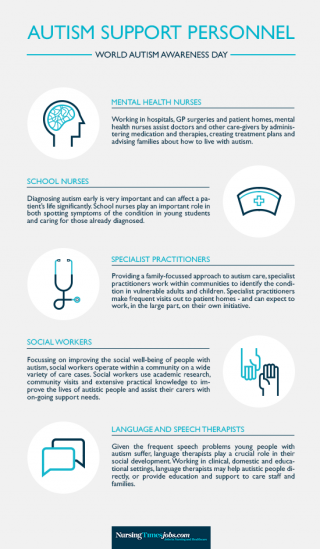Caring for Autism - Community Care Roles

Autism is normally classified as a disorder affecting social interaction, communication and behaviour - and includes Asperger's Syndrome and Childhood Autism. Autism affects patients with varying degrees of severity and many individuals live quite comfortably with the condition. More severe cases of autism however, especially those affecting children, may manifest physically or as learning difficulties and require a greater level of care and professional supervision.
The symptoms of autism are numerous but more noticeable traits include:
- Delayed speech development and monotonous speech tone
- Inability to understand metaphors or subtle verbal features, like sarcasm
- Rejecting the affection of others or reacting unreasonable negativity to suggestions
- Fierce protectiveness of personal space
- A lack of awareness of the personal space of others
- A strong inclination towards social routine and consistency
- Little interest in interacting with others and a inability to react appropriately to social protocols, like greetings
Autistic people may be diagnosed as children - but many adults also discover they have the condition. Given its variety of effects, autism can adversely affect a sufferer's ability to make friends, find employment or simply function safely in a domestic setting. Fortunately, many local authorities offer support for patients struggling with these challenges - including community support programmes and the expertise of professional care-givers.
Community support programmes put in place to help people with autism involve a variety of Autism Support Personnel including:
Mental Health Nurses
Working in hospitals, GP surgeries and patient homes, mental health nurses assist doctors and other care-givers by administering medication and therapies, creating treatment plans and advising families how to live with autism.
School Nurses
Diagnosing autism early is very important and can affect a patient's life significantly. School nurses play an important role in both spotting symptoms of the condition in young students - and caring for those already diagnosed.
Specialist Practitioners
Providing a family-focused approach to autism care, specialist practitioners work within communities to identify the condition in vulnerable adults and children. Specialist practitioners make frequent visits out to patient homes - and can expect to work, in the large part, on their own initiative.
Social Workers
Focusing on improving the social well-being of people with autism, social workers operate within a community, on a wide variety of care cases. Social workers use academic research, community visits and extensive practical knowledge to improve the lives of autistic people and assist their carers with on-going support needs.
Language and Speech Therapists
Given the frequent speech problems young people with autism suffer, language therapists play a crucial role in their social development. Working in clinical, domestic and educational settings, language therapists may help autistic people directly, or provide education and support to care staff and families.
Anyone wishing to begin a career in autism care should take the time to research the many educational programmes available across the country. Universities and colleges offer qualifications dedicated to autism care - the majority of which take place at a post-graduate level. All higher education nursing qualifications however, involve their own specific course of study and UK nurses must attain their degree before becoming registered and applying for jobs. Courses dedicated to autism study - and the care of people with autism - are designed to improve professional and social understanding of the disorder and promote an excellent level of care for autistic people everywhere.
